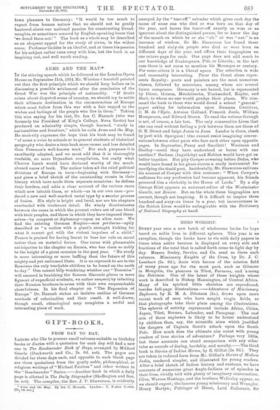ARMS AND THE MAP"
IN the stirring speech which be delivered at the London Opera House on September 11th, 1914, Mr. Winston Churchill pointed out that the first principle which we should keep before us in discussing a possible settlement after the conclusion of the Great War was the principle of nationality. " If doubt arises about disputed areas of country, we should try to settle their ultimate destination in the reconstruction of Europe which must follow from this war with a fair regard to the wishes and feelings of the people who live in them." Taking this wise saying for his text, Dr. Ian 0. Bunnell (who was formerly the President of King's College, Nova Scotia) has produced an admirably simple, though learned, "study in nationalities and frontiers," which he calls Arms and the Map. He modestly expresses the hope that his book may be found "of some ssrviee to schools or to general students of historical geography who desire a text-book more recent and less detailed than Freeman's well-known work." For such purposes it is excellently adapted, and we must add that it is thoroughly readable, no were Dryasdust compilation, but really what Charles Lamb would have declared worthy of the much- abused name of book. The author takes all the chief political divisions of Europe in then—beginning with Germany— and gives a brief sketch of the outstanding events in their history which have made them separate countries : he defines their borders, and adds a clear account of the various races which now inhabit them, or which—as in our own ease—pro- duced a new and wen-marked racial type by a secular process of fusion. His style is bright and lucid, nor are his chapters overloaded with irrelevant detail. He wisely discriminates between the cases in which the present rulers are of one blood with their peoples, and those in which they hive imposed them- selves—by conquest or diplomacy—upon an alien race. We find the existing German Empire—mesa poriturus—aptly described as "a nation with a giant's strength kicking for what it cannot get with the violent impulses of a child." France is praised for having learnt to base her rule on moral rather than on material forces. One turns with pleasurable anticipation to the chapter on Russia, who has risen so nobly
to the height of a great occasion in the past year. No study is more interesting or more baffling than the future of this mighty and yet unformed State. It is no reproach to see in the Russians the only teachable children to be found on the earth to-day." One cannot help wondering whether our" Tummies" will succeed in banishing the famous Slavonic gloom in mere figment of superficial students, we rather suspect) by infecting their Russian brothers-in-arms with their own unquenchable cheerfulness. In his final chapter on "The Expansion of Europe" Dr. Hannah etches an incisive outline of German methods of . colonization and their result. A well-drawn, though small, ethnological map completes a useful and interesting piece of work.














































 Previous page
Previous page